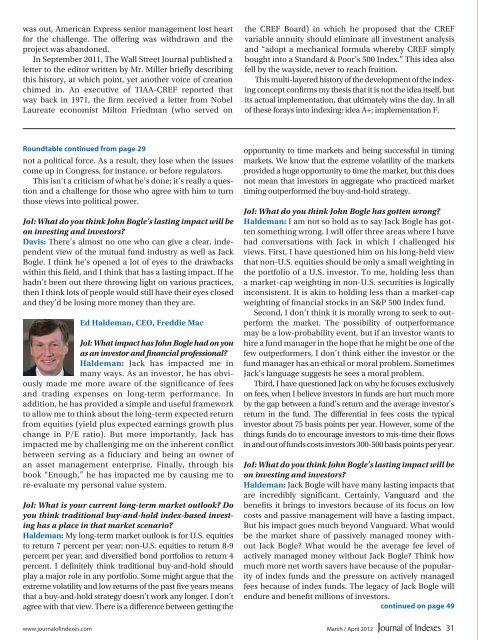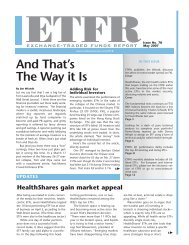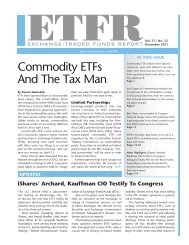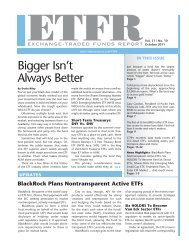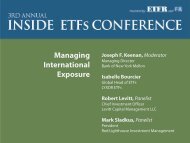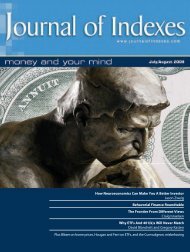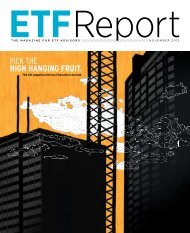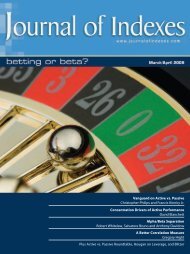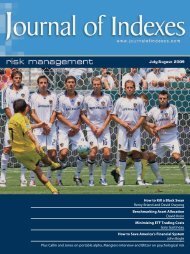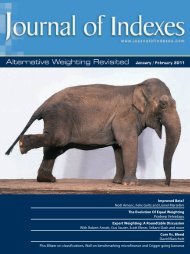Create successful ePaper yourself
Turn your PDF publications into a flip-book with our unique Google optimized e-Paper software.
was out, American Express senior management lost heart<br />
for <strong>the</strong> challenge. The offering was withdrawn and <strong>the</strong><br />
project was abandoned.<br />
In September 2011, The Wall Street Journal published a<br />
letter to <strong>the</strong> editor written by Mr. Miller briefly describing<br />
this history, at which point, yet ano<strong>the</strong>r voice of creation<br />
chimed in. An executive of TIAA-CREF reported that<br />
way back in 1971, <strong>the</strong> firm received a letter from Nobel<br />
Laureate economist Milton Friedman (who served on<br />
<strong>the</strong> CREF Board) in which he proposed that <strong>the</strong> CREF<br />
variable annuity should eliminate all investment analysis<br />
and “adopt a mechanical formula whereby CREF simply<br />
bought into a Standard & Poor’s 500 Index.” This idea also<br />
fell by <strong>the</strong> wayside, never to reach fruition.<br />
This multi-layered history of <strong>the</strong> development of <strong>the</strong> indexing<br />
concept confirms my <strong>the</strong>sis that it is not <strong>the</strong> idea itself, but<br />
its actual implementation, that ultimately wins <strong>the</strong> day. In all<br />
of <strong>the</strong>se forays into indexing: idea A+; implementation F.<br />
Roundtable continued from page 29<br />
not a political force. As a result, <strong>the</strong>y lose when <strong>the</strong> <strong>issue</strong>s<br />
<strong>com</strong>e up in Congress, for instance, or before regulators.<br />
This isn’t a criticism of what he’s done; it’s really a question<br />
and a challenge for those who agree with him to turn<br />
those views into political power.<br />
JoI: What do you think John Bogle’s lasting impact will be<br />
on investing and investors?<br />
Davis: There’s almost no one who can give a clear, independent<br />
view of <strong>the</strong> mutual fund industry as well as Jack<br />
Bogle. I think he’s opened a lot of eyes to <strong>the</strong> drawbacks<br />
within this field, and I think that has a lasting impact. If he<br />
hadn’t been out <strong>the</strong>re throwing light on various practices,<br />
<strong>the</strong>n I think lots of people would still have <strong>the</strong>ir eyes closed<br />
and <strong>the</strong>y’d be losing more money than <strong>the</strong>y are.<br />
Ed Haldeman, CEO, Freddie Mac<br />
JoI: What impact has John Bogle had on you<br />
as an investor and financial professional?<br />
Haldeman: Jack has impacted me in<br />
many ways. As an investor, he has obviously<br />
made me more aware of <strong>the</strong> significance of fees<br />
and trading expenses on long-term performance. In<br />
addition, he has provided a simple and useful framework<br />
to allow me to think about <strong>the</strong> long-term expected return<br />
from equities (yield plus expected earnings growth plus<br />
change in P/E ratio). But more importantly, Jack has<br />
impacted me by challenging me on <strong>the</strong> inherent conflict<br />
between serving as a fiduciary and being an owner of<br />
an asset management enterprise. Finally, through his<br />
book “Enough,” he has impacted me by causing me to<br />
re-evaluate my personal value system.<br />
JoI: What is your current long-term market outlook? Do<br />
you think traditional buy-and-hold index-based investing<br />
has a place in that market scenario?<br />
Haldeman: My long-term market outlook is for U.S. equities<br />
to return 7 percent per year; non-U.S. equities to return 8-9<br />
percent per year; and diversified bond portfolios to return 4<br />
percent. I definitely think traditional buy-and-hold should<br />
play a major role in any portfolio. Some might argue that <strong>the</strong><br />
extreme volatility and low returns of <strong>the</strong> past five years means<br />
that a buy-and-hold strategy doesn’t work any longer. I don’t<br />
agree with that view. There is a difference between getting <strong>the</strong><br />
opportunity to time markets and being successful in timing<br />
markets. We know that <strong>the</strong> extreme volatility of <strong>the</strong> markets<br />
provided a huge opportunity to time <strong>the</strong> market, but this does<br />
not mean that investors in aggregate who practiced market<br />
timing outperformed <strong>the</strong> buy-and-hold strategy.<br />
JoI: What do you think John Bogle has gotten wrong?<br />
Haldeman: I am not so bold as to say Jack Bogle has gotten<br />
something wrong. I will offer three areas where I have<br />
had conversations with Jack in which I challenged his<br />
views. First, I have questioned him on his long-held view<br />
that non-U.S. equities should be only a small weighting in<br />
<strong>the</strong> portfolio of a U.S. investor. To me, holding less than<br />
a market-cap weighting in non-U.S. securities is logically<br />
inconsistent. It is akin to holding less than a market-cap<br />
weighting of financial stocks in an S&P 500 Index fund.<br />
Second, I don’t think it is morally wrong to seek to outperform<br />
<strong>the</strong> market. The possibility of outperformance<br />
may be a low-probability event, but if an investor wants to<br />
hire a fund manager in <strong>the</strong> hope that he might be one of <strong>the</strong><br />
few outperformers, I don’t think ei<strong>the</strong>r <strong>the</strong> investor or <strong>the</strong><br />
fund manager has an ethical or moral problem. Sometimes<br />
Jack’s language suggests he sees a moral problem.<br />
Third, I have questioned Jack on why he focuses exclusively<br />
on fees, when I believe investors in funds are hurt much more<br />
by <strong>the</strong> gap between a fund’s return and <strong>the</strong> average investor’s<br />
return in <strong>the</strong> fund. The differential in fees costs <strong>the</strong> typical<br />
investor about 75 basis points per year. However, some of <strong>the</strong><br />
things funds do to encourage investors to mis-time <strong>the</strong>ir flows<br />
in and out of funds costs investors 300-500 basis points per year.<br />
JoI: What do you think John Bogle’s lasting impact will be<br />
on investing and investors?<br />
Haldeman: Jack Bogle will have many lasting impacts that<br />
are incredibly significant. Certainly, Vanguard and <strong>the</strong><br />
benefits it brings to investors because of its focus on low<br />
costs and passive management will have a lasting impact.<br />
But his impact goes much beyond Vanguard. What would<br />
be <strong>the</strong> market share of passively managed money without<br />
Jack Bogle? What would be <strong>the</strong> average fee level of<br />
actively managed money without Jack Bogle? Think how<br />
much more net worth savers have because of <strong>the</strong> popularity<br />
of index funds and <strong>the</strong> pressure on actively managed<br />
fees because of index funds. The legacy of Jack Bogle will<br />
endure and benefit millions of investors.<br />
continued on page 49<br />
www.journalofindexes.<strong>com</strong> March / April 2012 31


